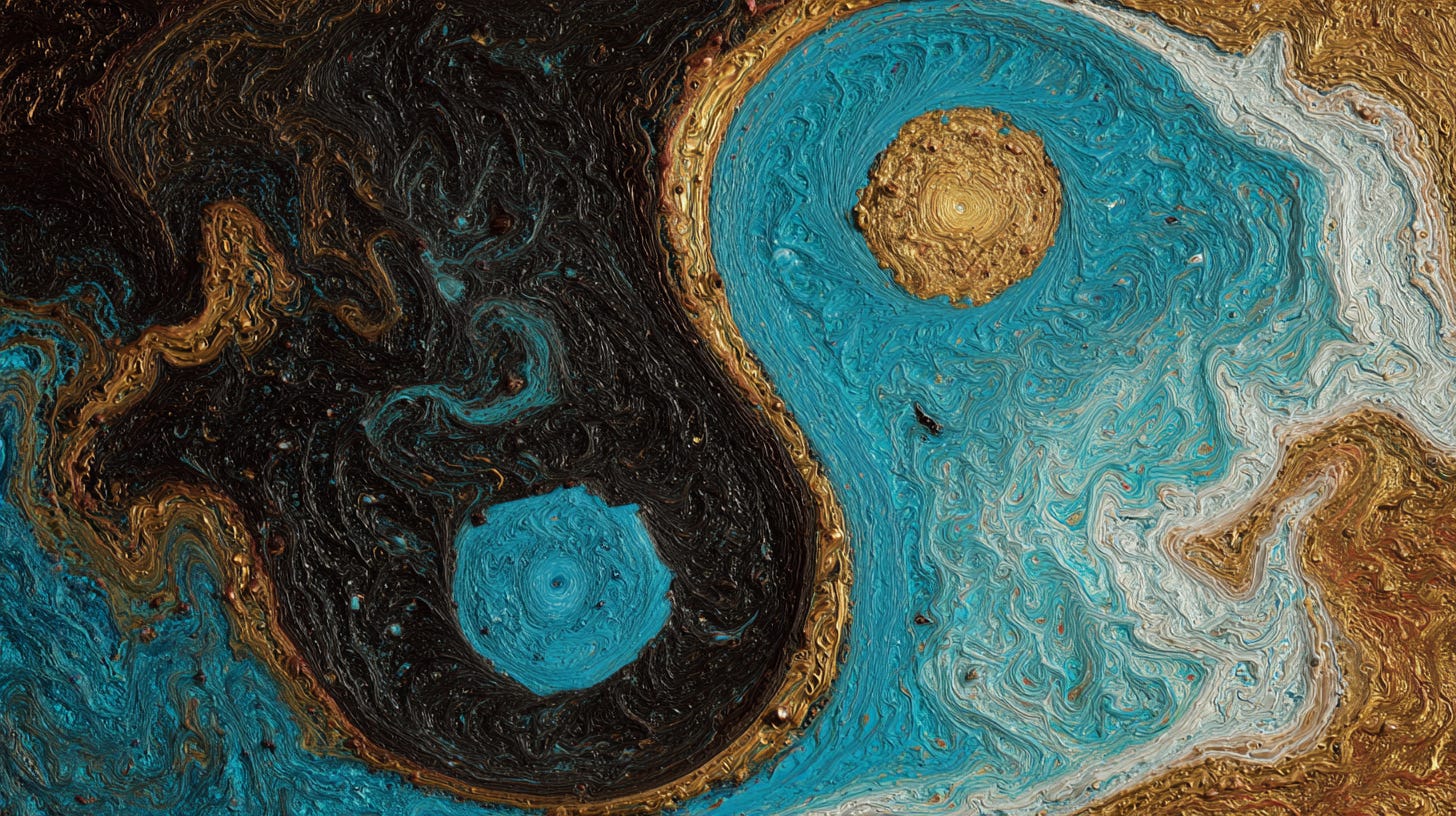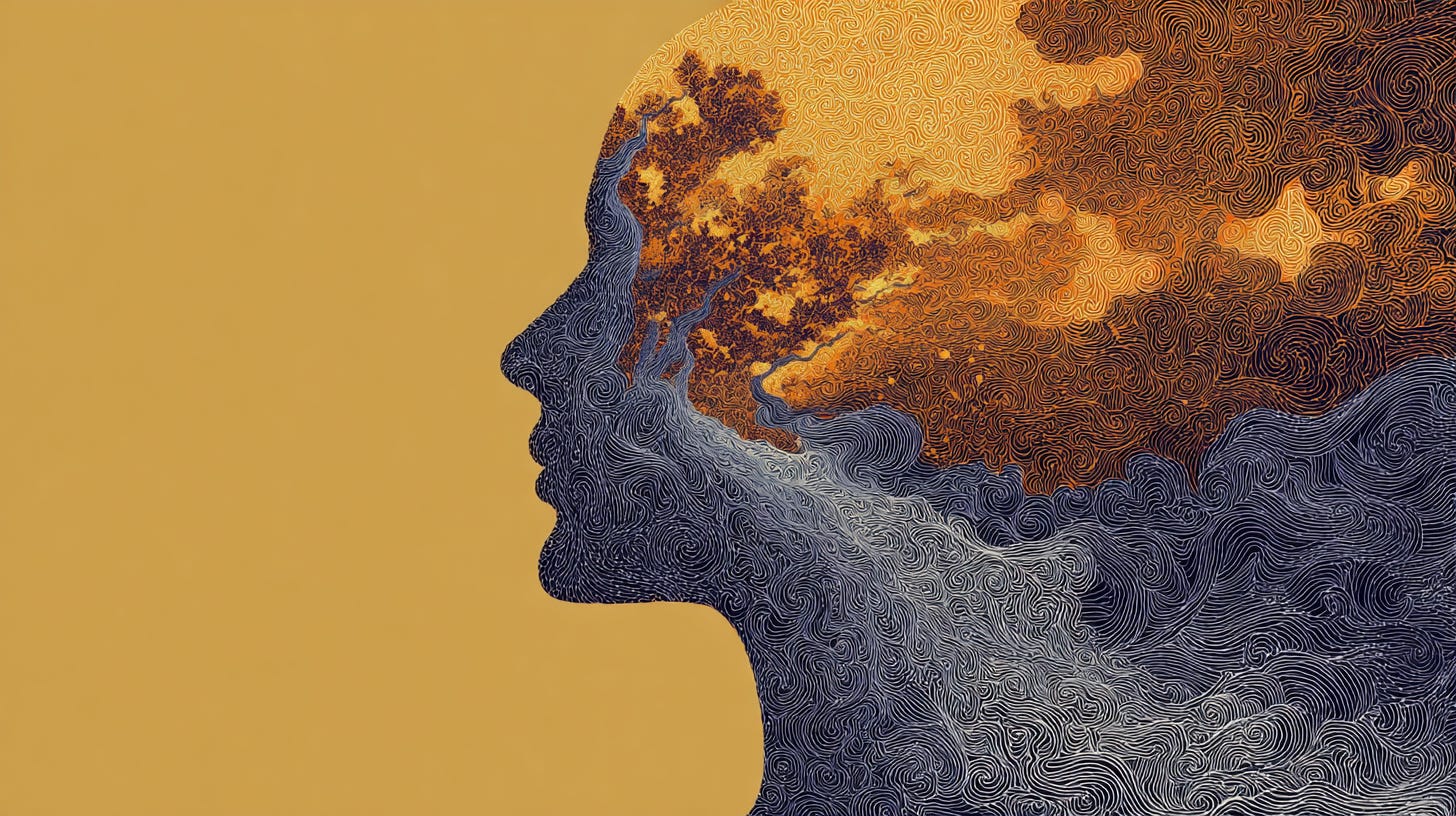Do Your Thoughts Have Texture?
a simple observation that requires a civilisations worth of philosophical thought to piece together the answer to
Disclaimer: I am just some guy making observations and writing words that sound right.
This is the first post in a (hopefully) three part series.
I start with a simple observation about the nature of mental phenomenon and from that try to piece together why western philosophy and eastern philosophy took radically different perspectives on phenomenology.
My perspectives are based on my existing (limited) knowledge of history and philosophy and the last 6-7 years of dedicated contemplative practice.
My existing beliefs on this matter are that the East absolutely nailed philosophy on the nature of mind and the West nailed philosophy on the nature of pretty much everything else.
The Texture of Thinking
Most mornings when I wake up, I take 10-15 minutes to just feel into my experience of the world. The most salient feature is usually the way that thoughts just arise unprompted. From stillness into a trickle of thoughts into a rush of memories and a flood of ideas and and and... it goes on.
I have practically no control over what arises and why. And my thoughts are often so delectably enticing. There seems almost an erotic quality to thinking. The thoughts clearly WANT to be thought.
And as you pay increasingly close attention to your experience, it becomes more and more apparent that every thought has a texture to it.
Texture might seem like a weird word for mental phenomena, but everything we experience has a textural quality to it, and mental phenomena are just another form of experience.
A memory of embarrassment has a hot, contracting quality. An exciting future plan feels effervescent, almost carbonated. Worry, a tight, circular, grinding texture.
I know I’m stepping into a minefield here and you’re perfectly right to call me out. Those aren’t just thoughts you’re describing, they’re feelings and emotions!
There’s a few assumptions underlying words that I use, so i’ll try to be clear from the outset what I mean by them:
Your mind is the interiority of your experience. It is where your representation of reality is generated and where all mental phenomena arises and is experienced.
Mental phenomena include all the various arisings in consciousness. Traditionally we carve these up into categories like thoughts, feelings and emotions. And it’s really fucking confusing. I tried while researching this to come up with meaningful category definitions and they just end up being circular in nature or defined by a particular school of psychological thought that made it up to fit their theories.
I’m serious, there is no presently agreed upon consensus for what exactly an emotion is or how it should be defined.
I’m not convinced any of it is accurate and I think the very notion of believing we can seperate them meaningfully is a category error. Perhaps the genesis of the entire issue.A thought for the purposes of this piece of writing will generally refer to the content-laden information stream that populates the mind. That is, the internal representation of information that arises in your mind. This can be in the form of language (internal monologue), imagery, kinesthetics or abstract non-verbal concepts. It also includes emotions and feelings that arise to signal information.
But Sometimes I will also probably use thinking to refer to the thing that happens when all mental phenomena get mixed up into a giant confusing tangle. So bear with me.
I don’t believe that you can really separate “thinking” from “feeling” or “emotions”. Yes in principle you can perform purely rational thought devoid of emotions to achieve some utility, but in reality just about all of our thoughts are intertwined with emotions. In fact, often the emotions come before the thoughts.
Honestly, I think trying to discretely categorise mental phenomena like this might be root of the confusion we find ourselves in today.
Yet More Categories To Consider
My friend Jenny asked me once whether I believed thoughts caused feelings, or feelings caused thoughts. And it certainly feels like a circular relationship to me. I can start thinking thoughts deliberately about unpleasant things that can careen me into a specific part of feeling space. And when the external world induces certain feelings in me, my thoughts immediately conform to and are affected by that reality.
Of course 'thinking' and 'thought' refer to a pretty wide array of psychological activities. The mind does after all have a lot of modes - reasoning, deliberating, judging, imagining, ruminating, remembering and of course feeling.
And that last one is… complicated.
Feelings don't typically originate in the mind but rather in the body... though you can use your mind to inspect feelings (“hmm what am I feeling…”) that then open up their own world of experience to you. And a memory can certainly trigger a feeling and an emotional state. A thought can trigger a desire, an impulse, a feeling... we do get ourselves into murky territory when we try to make distinctions like these.
These categories bleed into one another. The boundaries between thought and feeling dissolve under close examination.
Following The Garden Path
What you may notice when you pay attention to the way thoughts arise is that they chain other mental phenomena somewhat effortlessly.
In Buddhism this type of phenomenon is called papañca, often translated as mental proliferation and speaks to the minds inherent tendency to take a simple sensory input or thought and proliferate into more and more elaborate conceptual content.
For instance, thoughts often evoke memories (whatever those are), which trigger other sensory doorways, which trigger emotions which trigger more thoughts, which triggers body tension, which congeals around certain emotions, and now we’re having a full blown sensory experience across almost all faculties.
That single thought led you down a garden path you had no control over, but that all of a sudden has extraordinary control over your experience. It can just as easily make you angry as it can make you joyous. Just as easily make you cry over a lost connection or beam with delight over a new one.
And it all happened in the mind, perhaps with your eyes closed, spurred from a single thought that arose without your explicitly thinking it.
Of course it can’t be meaningful to say none of that was sensory, can it?
I mean clearly the whole faculty of thinking is deliciously rich with experience and stupidly high fidelity.
Okay so given all of that context, let’s get on to the question at the heart of this essay:
Why in the west do we only consider experience to be comprised of five senses: taste, touch, smell, sight and sound, excluding mental phenomena as a sense experience?
And why has the east for thousands of years recognised that mind should be considered a sixth sense; a sense organ that perceives mental objects like thoughts, memories, emotions, and mental formations, just as the eye perceives visual forms or the ear perceives sounds?
It took me the better part of twenty-seven years, a lot of meditation, a few meditation retreats, some psychedelic experiences and listening to a lot of dharma talks to actually grok that thoughts had textures. I don’t think it’s because I am especially oblivious or unaware of my experience but rather because Western culture simply doesn't orient us towards noticing it.
The Missing Sense
I was educated in the west with a fairly typical middle-class education, and I learned all about the five senses, exactly how they work functionally and what their phenomenology is like. But thoughts and mental phenomena at large were never discussed at length in terms of their sensory or phenomenological qualities. Certainly, we learn words to describe our emotions and to identify them but not to reflect on how the interiority of our mental experience actually arises.
We learn a lot about “how” to think and reason to solve problems. But rarely much at all about what thoughts are, where they come from or how they tie into other phenomena.
This is largely left as an exercise to the reader who almost never gets around to it until (if they are lucky) they eventually discover meditative practices at some points.
Or maybe these questions just aren’t that obviously relevant from a particular viewpoint of theory of mind? But it clearly matters! A lot of people seem to have a deeply confused and adversarial relationship with their thoughts and emotions. And is perhaps why contemplative practices are having such a moment in the spotlight right now.
Really, it shouldn’t be that much of a surprise to learn that you can just notice the thoughts in your mind as they arise and let them pass rather than cling/act on them, and if you do this long enough you can get to a place of stillness and peace rather than constant churning chaos; but apparently it is a surprise. What does that tell us about our understanding of our mental interiority?
I mean this is all kind of crazy if you think about it.
Mental phenomena are maybe the most significant of all of the senses as they are more closely tied to ongoing states of happiness or sadness than anything else. Most people are typically not suffering from depression or anxiety because one or more of their five senses is giving them negative stimuli, they are suffering because they are stuck in negative attractor basins of the mind. This may well be intimately tied to chronic body tension and emotions/trauma trapped in tissue structures - but this itself is a complex interplay between sensory organs and pure mental phenomena.
There is of course a particular framing through which mind is clearly not a sense. In it’s simplest form it goes something like this:
Senses are tied to sense organs, and the mind is the central entity which interprets all sensory information and figures out what it all means. And thoughts are a layer of reasoning over this that lets us understand the world and achieve goals in it.
But if thoughts themselves can generate phenomenological texture independent of sensory stimuli, this model kind of falls apart doesn’t it?
We learned about taste buds and light waves, the mechanics of smell and the physics of sound. But the thing we were using to learn and process all of this, the mind itself, was largely exempt from sensory categorisation.
Why?
I don’t remember how I conceptualised thoughts and their phenomenology prior to my inculcation into eastern philosophy of mind… So if someone remembers please let me know.
In any case, it seems fairly obvious that there is (was?) a clear distinction in the west between the five senses of touch, taste, sight, smell, sound and ‘mind stuff’. This has been the prevailing model for millennia, since Aristotle instantiated his model of the five senses + the common sense.
(Perhaps it was all Aristotles fault?)
More recently biology recognises a lot of other bodily senses: proprioception, interoception, thermoception, nociception, magnetoception, chronoception,.. the list goes on. Clearly the various faculties of the body are doing a lot of sensing!
But these seem a lot of easier to justify than shifting our perspective of mental experience itself as another sense and the mind as a sense organ.
The Other Timeline
But contemplative traditions in the East developed sophisticated frameworks for understanding consciousness and mental phenomena thousands of years ago.
How come?
Vedic traditions dating as far back as 1500BC show deep obsession with practices centred on altered states of consciousness, meditation and understanding mental phenomena.
Why?
Buddhism explicitly lists the mind as the sixth sense organ, capable of perceiving mental objects just like the eye perceives visual forms. Like 2500 years ago.
?
Why did phenomenology as a philosophical movement not properly emerge until the 19th century, while Buddhist philosophy had been mapping this territory with the precision of a freaking anatomist for over two millennia.
??
Seriously, how do you go thousands of years without recognising mind as a sense organ despite intimately swimming in the phenomenology of that organ?
Obviously it is not the case that western thinkers were oblivious to this.
I refuse to believe that some of the most intellectually rigorous, thoughtful and sensitive people to have ever lived did not realise that their mental phenomena had a sensory quality to it. That they did not study the arising of their thoughts and recognise the way they congealed and created experience.
And yet, the west seemingly held a determined stance that mind is not a sense doorway.
I suspect the reasons for this are extremely interesting.
The western philosophical project was the progenitor of incredible insights into society, law, governance, ethics and morality. But why did it get nature of mind so wrong? Did it really? Am I just confused and misinformed?
This is what I want to answer in this essay series.
On cursory investigation it is a fascinating and deep question. It has to do with the geography of the regions (East vs West) that strongly influenced philosophical focus, the Eastern traditions' continuity with Vedic contemplative practices dating back millennia, the might of Aristotles ideas and a hesitancy to challenge the orthodoxy, the focus of the Roman Empire on practice governance and law over abstract philosophy, the preservation of Greek thought through Islamic scholars while Europe fragmented after Rome's fall and the rise of Christian theology and its overwhelming emphasis on the soul's divine nature rather than the mechanics of mental experience.
So if all of that sounds interesting to you, follow along as I try to unravel this. The next post will try to piece together the history of western philosophical thought on… thought and understand how we got to where we are. And why the east got somewhere very different.
And tomorrow morning when you wake up, take a moment. Feel what arises. Notice it’s texture.







